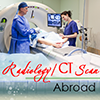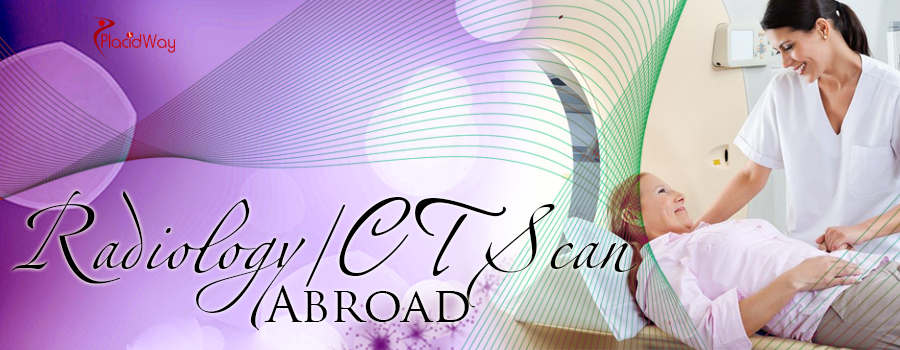Radiology/CT Scans


Diagnostic Radiology Abroad
Diagnostic radiology is the field of medicine that uses imaging exams and procedures to diagnose a patient. In any form of medical care, diagnostic radiology plays an integral part in the diagnosis of disease or injury. The exams often use radiation, at levels that have been determined to be safe, to create detailed anatomical images.
Types of diagnostic radiology
- General Diagnostic Radiology
- Computed Tomography (CT)
- CT Enterography
- Magnetic Resonance Imaging (MRI)
- Positron Emission Tomography (PET/CT)
- Ultrasound
- Nuclear Medicine
- Nuclear Stress Test
- CCTA - Coronary CT Angiography
- Cardiac MR
- Pediatric Radiology Services
- Women's Imaging
What is Computed Tomography?
Computed tomography, CT or CAT Scan has revolutionized medical care by providing detailed images of the body and disease processes. A CT Scan uses an x-ray beam that rotates around the patient generating data used by a computer to create an image of the body's internal structure.
The study appears as slices, similar to a loaf of bread, which are put together to create a three-dimensional view, clearly showing both bone and soft tissue. The detailed pictures may show problems in soft tissues, body organs, and bones. CT is usually used to examine the brain, sinuses, lungs, chest, abdomen, pelvis, and skeleton.
The versatility of the CT exam in providing precise body images has allowed it to replace many painful diagnostic procedures, as well as several that are more costly. In some cases, it also has eliminated exploratory surgery. That is why CT scanning is among the major diagnostic tools used today by radiologists.
How is a CT performed?
The CT technologist will explain the procedure to you for two main reasons: to solicit your cooperation and to put your mind at ease as to what is taking place. Next, you will be gently positioned and secured on the scan table. It is important that you be secured because even the slightest movement during the split seconds of imaging can blur the picture and result in the need for repeated scans. The technologist will have you in view at all times and will be in constant communication via two-way intercom. During this brief time, you will hear the humming of the equipment as it produces the images. You may also feel the slight movement of the table as it prepares for the next scan.
The exam usually takes 15 to 45 minutes. This allows for preparation as well as time for the computer to generate the images. The radiologist will study the results of your exam and discuss them with your doctor, who will then consult with you.
Benefits of a CT scan
- Studying the chest and abdomen.
- Diagnosing cancer.
- Diagnosing and treating spinal problems and injuries to the hands, feet and other skeletal structures.
- Measuring bone mineral density for the detection of osteoporosis.
- Identifying injuries to the liver, spleen, kidneys, or other internal organs.
- Detecting, diagnosing and treating vascular diseases that can lead to stroke, kidney failure, or even death.
What is the cost of computed tomography?
Unfortunately, there isn't a standard price for CT scans. The price depends on where you live, the clinic or hospital where you have the CT, the part of the body that you have to scan and the radiologist charge. In the US the difference in cost for a CT scan could be thousands of dollars, from $410 to $2,334 that is why it is important to shop around before having the scan.
If you choose to travel abroad for this procedure you could save a lot. To make an idea, the starting price for a CT scan in Turkey is $330, in Hungary $175, in Thailand $200, in the UAE $270, in India $50 and in Mexico $270.
Who performs a CT scan?
A CT scan is performed by a radiologist who has graduated from an accredited medical school, passed a licensing examination, and completed a residency of at least four years of unique postgraduate medical education in, Radiation safety/protection, Radiation effects on the human body or Appropriate performance and interpretation of quality radiologic and medical imaging examinations.
The use of medical imaging procedures by unqualified providers may needlessly expose you to radiation or radiation levels that could be unduly hazardous. It may also result in misdiagnosis or problems that are not diagnosed at all.
To find out more about how a CT scan is performed and where you can find the best prices abroad, do not hesitate to contact us!
By: PlacidWay,

